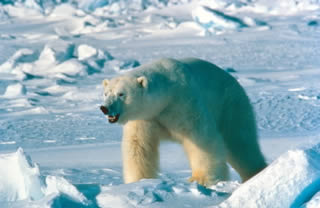
 |
Newsweek: Global Warming Not So Bad?April 12, 2007Courtesy of Far North Science Newsweek has hit the streets with a special report on Learning to Live with Global Warming, with many stories taking an optimistic tone and focusing on action by officials and entrepreneurs. It's got a carbon footprint calculator and a lead piece on California Gov. Arnold Schwarzenegger's "Crusade."  Polar bears may lose their ice habitat, but how about that new shipping lane? Polar bears may lose their ice habitat, but how about that new shipping lane?USFWS Photo Worth checking out, but there's something disconcerting here, of the "how did you like the play, Mrs. Lincoln?" variety. A few outtakes are downright smug. In the short term there will be winners and losers from climate change. Fairly or not, the tilt is destined to favor the countries of the rich North, to the detriment of the poorer South. Within a few decades or so, a balmy Greenland may again deserve its name. With the world facing drought, coastal flooding, crop failures, famine, unpredictable swings in weather, killer heat waves, millions of people displaced, shifts in ocean life and the possibility of extinction for 30 percent of animal and plant species, do we really need Yale's Robert Mendelsohn telling us "the charming thing about adaptation by private entities is that they will do it for themselves." The story on the Arctic - Hot on the Pole - pretty much ignores the major scientific questions and ecological catastrophes on the horizon in favor of a breezy, upbeat discussion of new economic prospects. It also repeats several maddening over-generalizations often committed by atlas-impaired journalists who live in the Lower Latitudes of Darkness (at least during the summer).
Beneath its lead photo of caribou grazing in the Arctic National Wildlife Refuge, this flip caption sets the tone: "The bears may be unhappy, but the region, stretching from Alaska to the northern tip of Norway and on to Siberia, is acquiring new economic and geostrategic significance as oilmen yearn for easier access to its mineral wealth." For instance, in Churchill, Manitoba, Arctic warming's significance isn't the delay in fall ice that has already triggered sharp declines in Hudson Bay polar bear health and numbers. It's the expanded shipping possibilities of its once-defunct port. Any optimism being felt in Churchill looks well placed. Temperatures in the Arctic have been rising faster than anywhere else in the world, and the dense sea ice that's covered the ocean for the past 30,000 years, fluctuating with the seasons, is thawing fast. This is rather like writing a story about Shishmaref, Kivalina and Newtock - three Alaska villages that must relocate at a cost of up to $100 million each or be slowly destroyed by flooding and erosion - and trumpeting the coming boom in housing construction and barge contracts. "Of course, the warm-up has nasty implications," the article admits. "But for the farsighted, the Arctic is a new Klondike ripe for exploitation." |
|